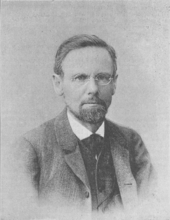INRI (Peter Rosegger)
INRI is a Jesus novel by the Austrian writer Peter Rosegger , published in 1905 by L. Staackmann in Leipzig .
Basics
Before the novel was published, works by Reimarus (1792) to William Wrede (1901) were published on the life of Jesus research .
Frame narration
A pardon has been submitted to the king. The carpenter Konrad Ferleitner, who is no more than 40 years old, waits for weeks in the cell for poor sinners to be executed. Konrad had worked in several major German cities. The journeyman had joined an association in Hamburg that was planning an assassination attempt on the chancellor. Konrad was selected as a revolver shooter by drawing lots. Although the victim survived, Konrad was sentenced to death by hanging. Konrad can hardly stand the wait and writes down the life of Jesus in the cell (internal story). The carpenter finished writing when the Chancellor died from his gunshot wound. Konrad is to be executed the next day. But first he dies in his cell. In his last days during his lifetime, strength had flowed to him through writing: "When it comes, I will be strong."
Internal narration
A craftsman - in its Jesus biography after the pattern of the carpenter Konrad Ferleitner describes Messiade least three example. Jesus Christ worked in his closer home on the Sea of Galilee . First, a miracle: how the Nazarenes smoothed the lake called high waves to the immeasurable astonishment of his disciples, who feared for their lives in the swaying boat (“ storm calming ”) and walked along the waters unscathed (“ sea change ”). Then secondly, then safely landed on the western shore of the lake in Magdala , an encounter that takes an astonishing turn: The fallen girl Mary Magdalene becomes his faithful disciple. And third, the first big appearance: On the northern edge of the lake, the grandiose Sermon on the Mount in front of Jesus' growing following in Galilee .
The carpenter Konrad Ferleitner writes like a professional; cleverly uses the element of repetition. Here are three examples. Firstly, shortly before his capture, Jesus met Mary Magdalene again in the Jerusalem Bethany at the foot of the Mount of Olives in Martha's house . Second, a variety of such narrative repetition is also visible in the changing sympathies that the Jewish people show towards the Nazarene Messiah, whom they ultimately call "incitator" and "seducer". Third, Jesus' mother Mary repeatedly worries about her son; wants her boy at home to fill the poorly performing carpentry workshop of the late father Josef with new life. The itinerant preacher rejects the supplicant; can be strict to her, but remains intimately connected to her until death on the cross.
Jesus had been found not guilty by Prefect Pontius Pilate . But the Galilean rabbits had collected volumes of incriminating material about their compatriot, and the high priest Caiaphas had warned that everything Jesus said had a hidden meaning. After all, Pontius Pilate couldn't help it. Since the mass of Jews on Jerusalem Street loudly demanded Jesus' death, he immediately had him crucified together with the desert robbers Barab and Dismas .
filming
- 1923 Germany : INRI - A film of humanity . Silent film by Robert Wiene with Erwin Kalser as the assassin Konrad Ferleitner, Gregori Chmara as Jesus Christ, Henny Porten as Maria (mother of Jesus), Asta Nielsen as Maria Magdalena, Bruno Ziener as Simon Petrus , Emil Lind as Thomas , Max Kronert as Jakobus the Elder , Alexander Granach as Judas Iscariot , Emanuel Reicher as high priest Caiaphas and Werner Krauss as Pontius Pilatus.
literature
expenditure
- INRI Good news from a poor sinner . L. Staackmann , Leipzig 1905 ( archive.org ).
- INRI Good news from a poor sinner. by Peter Rosegger . L. Staackmann. Leipzig 1916
- INRI Outlook Verlag 2018, ISBN 978-3-7326-7087-1
Secondary literature
- Hans-Anton Ederer: Was Peter Rosegger a religious writer? Or: literary depreciation due to religious sentimentality. Pp. 172-185 in: Wendelin Schmidt-Dengler (ed.) And Karl Wagner (ed.): Peter Rosegger in context . Böhlau, Vienna 1999, ISBN 3-205-98841-8
Remarks
- ↑ INRI = Cross Title : initials for the Latin phrase Iesus Nazarene Rex Iudaeorum (Jesus of Nazareth, King of the Jews).
- ↑ There are so many questions raised in the novel that the reader must find answers to. For example: Why does Jesus lead the disciples into the desert? A couple of times in the following text there is a partial answer, hidden in "the desert where great thoughts live". There is an answer to other urgent questions - although not a satisfactory answer. For example, towards the end of his life, the Nazarenes also alienated the supporters because he no longer performed any body miracles (healing the sick). Jesus declares that he actually wants to heal souls. But some questions are also answered succinctly. Why does Jesus voluntarily go to his death? His answer: A good shepherd gives life for his flock. In spite of this, the shepherd Jesus doubts his flock in view of his end: Who should lead those who are mine, who are still weak?
- ↑ In the book the reader comes across several passages where he has to keep and think after a word of Jesus. For example, when washing feet, Jesus says that there are no masters among people - only brothers. So that would mean, the reader concludes: According to Jesus, a Lord is not a real person.
